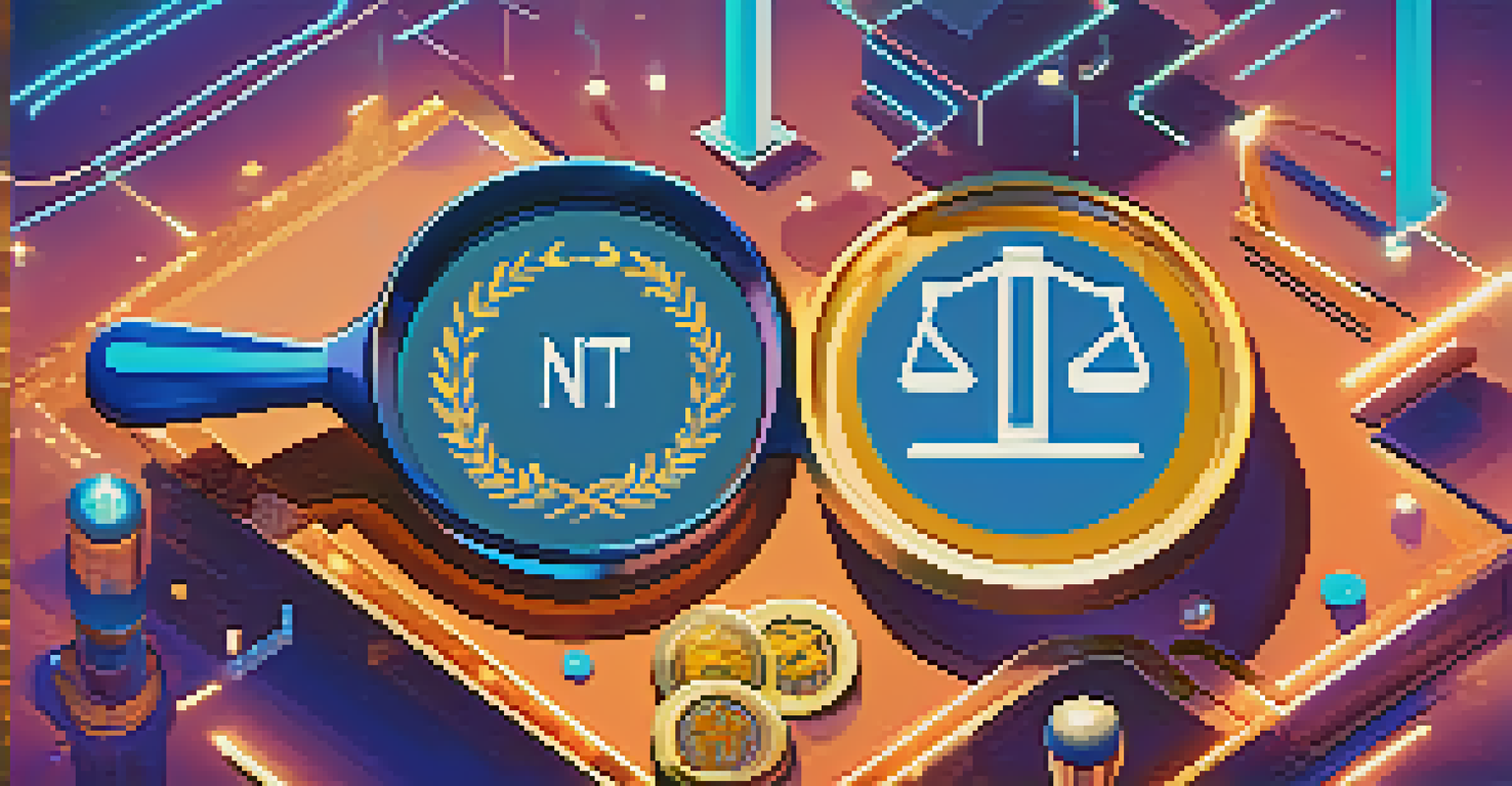Fraud and Scams in NFTs: Legal Recourse for Victims

Understanding NFTs: What Makes Them Attractive Yet Risky
NFTs, or non-fungible tokens, have taken the digital world by storm, offering unique ownership of digital assets. Their appeal lies in the ability to claim exclusive rights to art, music, and even virtual real estate. However, this uniqueness can also attract fraudsters looking to exploit unsuspecting buyers. Just like investing in a rare collectible, NFTs come with their own set of risks that can leave individuals vulnerable to scams.
In the world of NFTs, the only constant is change, and those who adapt quickly will thrive.
One of the key reasons NFTs can be risky is the lack of regulation in the space. Unlike traditional markets that have established consumer protections, the world of NFTs is relatively new and often unregulated. This absence of oversight can make it easier for dishonest sellers to misrepresent their offerings or even sell counterfeit tokens. As much as the allure of NFTs can be enticing, it’s crucial to navigate this space with caution and awareness.
Real-life examples have shown how quickly a seemingly trustworthy NFT can turn into a scam. For instance, some individuals have purchased NFTs only to later find out they were replicas or had no actual ownership rights. This unpredictability can be daunting, but a solid understanding of the NFT ecosystem can help potential buyers make informed decisions.
Common Types of NFT Scams You Should Know About
NFT scams come in various forms, with some of the most common being phishing attacks and fake marketplaces. In phishing scams, attackers may impersonate legitimate platforms to trick users into providing their private keys or wallet information. Once they have access, they can drain victims' accounts without a trace. This type of scam is particularly insidious because it preys on the trust users place in established platforms.

Another prevalent scam involves fake NFT marketplaces that lure buyers into making purchases that don’t exist. These fraudulent sites can look remarkably similar to reputable platforms, making it easy for unsuspecting users to fall victim. Once a purchase is made, victims are left with nothing, as the scammers vanish with their funds. It’s crucial for buyers to verify the authenticity of any marketplace before engaging in transactions.
NFTs: Unique but Risky Investments
While NFTs offer exclusive ownership of digital assets, they also come with significant risks, including fraud and lack of regulation.
Additionally, there's the 'rug pull' scam, where developers promote an NFT project to generate hype and investment, only to suddenly withdraw their support and take the funds with them. This leaves investors with worthless tokens and no recourse. Understanding these scams is the first step in safeguarding your investments in the NFT space.
Signs You Might Be a Victim of NFT Fraud
Identifying NFT fraud isn't always straightforward, but there are certain red flags to watch for. If an opportunity seems too good to be true, such as an NFT being offered at a significantly lower price than market value, it might be a scam. Always approach deals that promise extraordinary returns with skepticism, as they often come with hidden risks.
The digital frontier is filled with opportunities, but it also demands caution and awareness.
Another warning sign is the lack of transparency from sellers. If you can't find information about the creator or the NFT's history, it could indicate a potential scam. Legitimate sellers typically provide thorough details about their work and its provenance, so be wary of those who don’t. Trust your instincts; if something feels off, it’s better to err on the side of caution.
Lastly, if you experience unusual account activity or receive unsolicited messages from unknown sources regarding your NFTs, take immediate action. Scammers often use these tactics to create a sense of urgency and push victims into making hasty decisions. Staying vigilant can help you avoid falling prey to these deceptive practices.
Legal Framework for NFT Scams: What You Should Know
The legal landscape surrounding NFTs is still evolving, but there are regulations in place that can help victims of scams seek recourse. Depending on the jurisdiction, victims may have protection under consumer rights laws, which can hold scammers accountable for fraudulent behavior. Understanding these laws is crucial for anyone navigating the NFT space.
In some cases, legal actions can be taken against the platforms that facilitated the scam, especially if they failed to implement adequate security measures. For example, if a marketplace is found to be negligent in protecting its users, it could face lawsuits from victims. As the NFT market matures, more legal precedents will likely emerge, providing clearer guidelines for victims seeking justice.
Recognizing NFT Scam Red Flags
It's essential to be aware of warning signs of NFT fraud, such as deals that seem too good to be true and sellers lacking transparency.
However, navigating legal options can be complex. Consulting with a legal professional who specializes in digital assets can provide clarity and direction. They can help you understand your rights and the best course of action to take if you find yourself a victim of NFT fraud.
Steps to Take if You've Been Scammed in the NFT Space
If you suspect you've fallen victim to an NFT scam, the first step is to gather all relevant information about the transaction. This includes screenshots, transaction IDs, and any communication you've had with the seller. Having a detailed record can significantly aid any investigations or legal actions you may pursue in the future.
Next, report the scam to the platform where the transaction took place. Many marketplaces have procedures in place for reporting fraudulent activity, and they may be able to freeze accounts or assist in recovering lost funds. Additionally, consider reporting the scam to relevant authorities, such as the Federal Trade Commission (FTC) or local law enforcement, who may be able to provide further assistance.
Lastly, don't hesitate to reach out to others who may have experienced similar scams. Online communities can offer support and share information on how to navigate the aftermath of fraud. Engaging with these networks not only helps you feel less isolated but can also provide valuable insights into how to protect yourself in the future.
Preventative Measures: Safeguarding Your NFT Investments
Taking proactive steps can significantly reduce your risk of falling victim to NFT scams. First and foremost, always do your due diligence before making any purchase. Research the creator, the NFT's history, and the platform's reputation. Just as you would read reviews before dining at a new restaurant, apply the same principle when investing in NFTs.
Using secure wallets and enabling two-factor authentication can further protect your digital assets. Hardware wallets, which store your NFTs offline, provide an added layer of security that can deter hackers. Additionally, regularly updating your passwords and being cautious about sharing sensitive information can help keep your assets safe.
Safeguarding Against NFT Scams
Taking proactive measures like thorough research and using secure wallets can help protect your investments in the NFT space.
Lastly, stay informed about the latest trends and potential scams in the NFT space. Following reputable news sources and joining forums can help you keep your finger on the pulse of what’s happening. Knowledge is power, and the more aware you are, the better equipped you'll be to navigate this ever-evolving landscape.
The Future of NFTs: Legal Considerations and Consumer Protection
As the NFT market continues to grow, so too does the need for robust legal frameworks that protect consumers. Regulatory bodies are beginning to pay closer attention to this space, which may lead to more stringent laws governing NFT transactions. This shift could provide greater security for investors and help reduce the prevalence of scams.
Emerging trends suggest that platforms may soon be required to implement more comprehensive KYC (Know Your Customer) procedures. By verifying the identity of users, platforms can create a safer environment for transactions and work towards preventing fraud. This added layer of security can bolster consumer confidence and promote a healthier NFT marketplace.

However, as regulations increase, it’s essential for investors to remain vigilant. Even with legal protections in place, scammers will likely find new ways to exploit unsuspecting buyers. Staying informed and proactive will be key in navigating the future of NFTs, ensuring that you can enjoy this exciting digital frontier while minimizing risks.